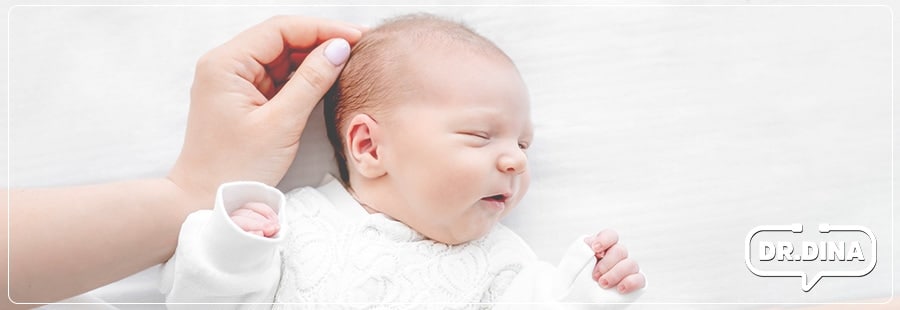Milestones and Your 1-Month Old Baby
The first month of a baby’s life is a fantastic time. Your baby is learning about the world and growing and changing every day. This is also an overwhelming time for a new parent as you are still getting used to your new role.
Below are some developmental milestones that you can expect to see over the next few weeks, as well as some tips on how to support your baby.
A young baby reacts to its surroundings and grows at its own pace, so you may not see all of the typical 1-month developments. Also, note that premature babies hit these baby milestones later. Therefore, they will develop according to their due date rather than their birthday. If you have pressing medical questions, make sure to seek professional medical advice.
Physical Development and Mobility
Usually, parents wonder about the rate of physical development of their newborn. Most babies grow about 1 to 1.5 inches in length and gain 1.5 to 2 pounds more than their birth weight during the first few weeks. Baby grows stronger as their muscles develop to prepare for walking and crawling. At 1 month old, the head is disproportionately larger than their body. Your baby’s doctor will monitor their head circumference to ensure that it is perfectly normal.
One-month-old babies have more developed reflexes than newborn reflexes. Your new baby has better motor skills and more control of their arm and leg movements this month. Baby will also begin to reach for and grasp nearby items and begin to lift their chin off the ground when lying on their belly. However, you still need to support your baby’s head when picking them up.

Vision, Hearing, and Communication
Although your baby’s eyesight and hearing are not fully developed yet, you will see progress in these areas. Newborns are very nearsighted and can see objects and people most clearly when they are 8-12 inches away. They prefer objects with bright colors, bright light, and high contrast patterns because they are easier to see.
Moreover, a baby’s eyes may cross when concentrating on an object, which is typical for the first few months. After that, they will begin to follow objects with their eyes and “look around.” As they look around, they may make facial expressions.
They will also start to look in the direction of some sounds. 1-month-olds babies can recognize their parents’ voices because they got used to hearing them in the womb even before the birth.
You will notice that your baby can communicate more at this age and appear more social and alert. Baby’s crying is their primary form of communication. 1-month-olds have different cries to communicate different thoughts such as “I’m hungry,” “I’m excited,” and “I’m uncomfortable.” They often cry when unattended seem happier when held. Your one-month-old baby also makes “happy sounds” when content and comfortable and seems happiest when they are in your arms.
1-month-olds make more consistent eye contact and relax when making eye contact. They also smile more consistently, especially with eye contact and familiar faces.
1 Month Milestones
Feeding your 1-month old baby
Babies can be either breastfed or bottle-fed, and both options are equally good for a baby’s growth. No matter if a baby is breast or bottle-fed, they need to feed 6-8 times a day at least. You will know your baby has had enough milk when they seem satisfied and may start falling asleep.
Your baby should have a wet diaper 4-6 times per day to signify that they are getting enough to eat. How frequent a baby poos is highly variable. Some breastfed babies poop up to 10 times a day, while some go many days without any stools. Most formula-fed babies poop 1 or 2 times a day. Breast milk tends to produce more watery and light-colored poop. Bottle-fed babies tend to have darker, more thick stools. If you notice any changes in the quality or frequency of your baby’s poop, call your pediatrician. Change dirty diapers as soon as you notice them to avoid rashes. Frequent diaper changes can make the baby a lot more comfortable. Their skin is very sensitive at this age.
How can I help my 30 days-old baby’s development?
You can support your one-month-old baby in the coming weeks by spending time with them. The following activities will help in achieving infant development milestones:
- Bicycling: Move your baby’s legs in a bicycling motion for a couple of minutes at a time by family members. This helps build and stretch muscles that your baby needs to prepare for crawling and walking.
- Tummy time: Place your baby belly down on your chest, across your lap, or on a firm, safe surface. While lying on their belly, they can practice lifting their head. Do this for a few minutes at a time, a few times a day. Tummy time helps with head control and strengthens shoulder and neck muscles.
- Cuddles: Your baby loves cuddles. Cuddles facilitate bonding and make them feel loved. You can practice cuddling by holding your baby close to your chest, your stomach and by gently massaging them.
- Talking: Babies love to hear the sound of a parent’s voice. So talk to your baby, and they will respond with coos and noises, which eventually become words.
Encouraging healthy sleep habits can be done even when your baby is very young. Developing a sleep routine so they can get used to the usual plan before bed can help set the stage for sleep. You can practice these skills during daytime naps as well. Baby’s sleep is essential for you and your young child to be healthy. Getting some fresh air while they sleep in the stroller can make you feel better and keep the baby healthy.
FAQs – Frequently Asked Questions
What is a good weight for a 1-month-old baby?
This depends on their birth weight. What’s most important is that your baby’s growing and gaining weight at a healthy pace. Babies gain weight about 2 pounds a month at this age. Your baby’s doctor will closely monitor their weight gain at their checkups, so you do not need to weigh them at home.
How much sleep does my 1-mont-old need?
More infants at this age will sleep 18-20 hours over a 24 hour period. Some sleep longer and some less long. As long as they are feeding, growing, and developing well, the amount of sleep doesn’t really matter.
Can a 1-month-old use a pacifier?
Your baby can start using pacifiers after birth. Many babies feel soothed when they use pacifiers. Infants should use a pacifier after or between meals, so their feeding schedule is not disrupted. In addition, using a pacifier when sleeping may reduce the risk of Sudden Infant Death Syndrome (SIDS). However, do not force your infant to use one if they are not interested. Make sure your breastfed baby is offered milk first before the pacifier to ensure they are full.
When should I call a doctor?
Fever is a medical emergency in a baby less than 2 months of age. If you notice your baby has a fever, go immediately to the emergency room. Do not give fever medication as the emergency doctor will want to check the temperature.
Make sure your child is up to date on their checkups. Most doctors see babies every month at this age. They will need a checkup when they turn one month old and again when they are two months old. Call your baby’s doctor if you have any questions or concerns between appointments.
Pay attention to your baby’s cues, and if you notice that anything is off, talk to a healthcare professional as it may be a medical problem.
If you notice the following symptoms, you should call a doctor as they may indicate a problem with your baby’s health:
- Your baby does not respond to sounds.
- Your baby is sleepy or lethargic.
- They have a cough, congestion, or runny nose.
- They will not stop crying no matter what – we call this irritability.
- You are finding it challenging getting the baby to sleep.
- There is a rash such as in the baby’s diaper area.
- Belly pain.
- Food sensitivity or vomiting – some spitting up is normal for infants. Abnormal vomiting includes forceful vomiting (such as projectile vomiting), if the vomit is dark green or bloody, the baby is vomiting many times, or if there is fever or diarrhea.
- The baby is not meeting their developmental or other milestones.
Dina is a wife, mother of 4, and adrenaline junky. She loves to share children’s health information from her professional and personal experience. More About Dr Dina.













